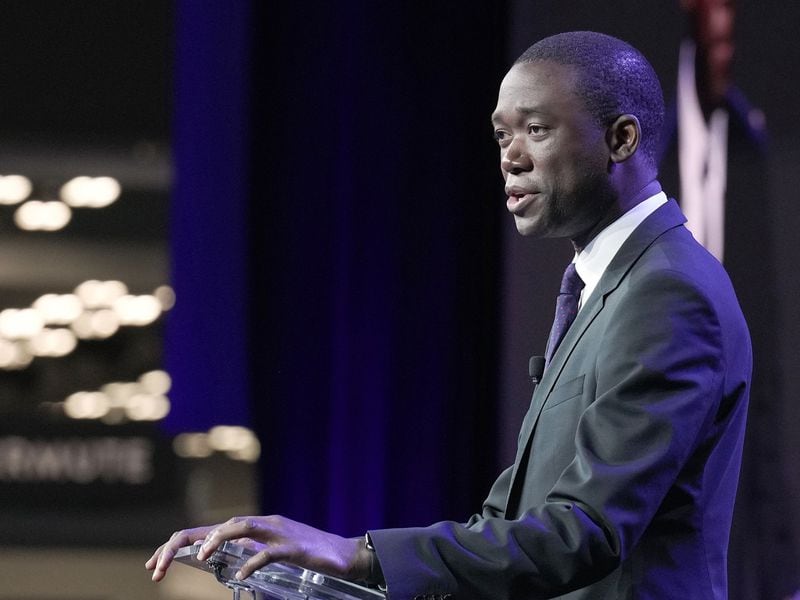
The U.S. Department of the Treasury is pressing lawmakers for a new set of powers that would give the government unprecedented enforcement and sanctions authority over the crypto sector, including the ability to roam well beyond American borders and get involved with transactions that don't involve its citizenry.
Deputy Secretary of the Treasury Wally Adeyemo has lobbied senior members of Congress with a proposal – mapped out in writing – that he called "a set of common-sense recommendations to expand our authorities and broaden our tools and resources to go after illicit actors in the digital asset space," according to excerpts from a speech he's set to deliver on Wednesday in Washington.
"Modes of raising and moving money continue to evolve and many of our authorities have not been updated in decades," according to the Treasury document sent to lawmakers and obtained by CoinDesk. Terrorist groups – including Hamas – "use new virtual methods to move, store and obfuscate their funding streams. These methods often include the use of evasive cryptocurrency networks and services, including mixers."
Congress should grant the Treasury "a new secondary sanctions tool" against exchanges that support terrorism, according to the proposal. It could give the government similar powers when targeting virtual asset providers as its long had over correspondent banking accounts and "would account for the technological changes that have rendered highly effective tools in the traditional payments context less effective against cryptocurrencies."
Adeyemo said it "will not only cut off a firm from the U.S. financial system, but will also expose any firm that continues to do business with the sanctioned entity to being cut off from the U.S. financial system."
Lawmakers should also beef up the department's powers under the Bank Secrecy Act (BSA), allowing for the "targeting of cryptocurrency entities and services that facilitate funding for terrorists," the proposal said. It calls for a new category of financial institutions under the BSA that would include "cryptocurrency exchanges, Virtual Asset Service Providers (VASPs), virtual asset wallet providers, certain blockchain validator nodes and decentralized finance services," requiring them to meet certain anti-money-laundering demands.
As the crypto industry has repeatedly argued: Many of these entities, such as wallet providers and decentralized finance (DeFi) entities may not be in any practical position to meet those kinds of requirements, and a law could effectively snuff them out.
Austin Campbell, the founder of Zero Knowledge Consulting, noted on X that the proposal has some reasonable points but is also asking for "the broadest expansions of powers since the Patriot Act, and in a way that makes a mockery of some of the technical details of modern communication with the side benefit of probably causing major geopolitical conflict due to the overreach."
The government is also apparently looking for power over Tether, the issuer of the biggest stablecoin, USDT, and its ilk.
"Legislation could explicitly authorize OFAC to exercise extraterritorial jurisdiction over transactions in stablecoins pegged to the USD (or other dollar-denominated transactions) as they generally would over USD transactions," the proposal suggested, giving a reach into transactions that the document notes "involve no U.S. touchpoints."
Adeyemo doubled down on that idea in his Wednesday remarks, saying that non-U.S. stablecoin issuers shouldn't be able to use the U.S. dollar without "procedures to prevent terrorists from abusing their platform."
This Treasury campaign cites reports on the crypto funding efforts from Hamas – made especially relevant in the context of that group's recent attacks on Israel – but the brief mention doesn't note that aspects of those reports had later been discredited by an analysis firm that was originally cited, leaving the extent of Hamas' crypto involvement uncertain.
Meanwhile, the Treasury Department is fresh off of an earth-shaking $4.3 billion settlement with Binance, which among fines to various agencies included the Treasury's largest-ever corporate penalty. The agreement saddled the biggest global exchange with monitors to report the company's ongoing behavior to U.S. government watchdogs. And also on Wednesday, the department announced its latest action against a crypto mixing service, Sinbad.
"As terrorists and criminals innovate their approach to illicit finance, we need tools to be able to keep up with them," Adeyemo said.
Read More: Stablecoins Such as Tether May Be in U.S. Sights, Top U.S. Treasury Official Warns
免责声明:本文章仅代表作者个人观点,不代表本平台的立场和观点。本文章仅供信息分享,不构成对任何人的任何投资建议。用户与作者之间的任何争议,与本平台无关。如网页中刊载的文章或图片涉及侵权,请提供相关的权利证明和身份证明发送邮件到support@aicoin.com,本平台相关工作人员将会进行核查。




